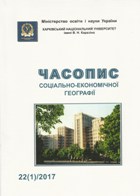The role of migration in the regional development and its appearance in the theories
Abstract
Phenomena relating to migration have a number of social, economic and political effects on both the sending and the host country. These impacts can vary depending on the reference period, region or sector as well as on the goals and aspects of our interpretation. Analysing the interference between immigration and regional development, we can rely on classic migration theories, however, a comparison of further models and concepts relating development and regional issues can be more useful for researchers. Another important question in connection with regional competitiveness is how decision makers act and react after perceiving migratory movements, thus this paper also aims to summarize the mainstream solutions and the controversies of migration policies that appear in the literature. Therefore it analyses the importance of integration and the main factors of inclusion as well. Besides, the aspects of methods and methodology also need appropriate attention. The paper finally presents these methodological issues of migration research exploring the typical questions and stumbling stones.
These questions are relevant, since regional development and the strategies in the background have strong association with migratory phenomena. However, a well-structured perspective is needed to confront the theoretical background of the 4 main areas: regional development, regional policy, migration and issues from research methods.
Downloads
References
2. Biffl, G., Skrivanek, I., Steinmayr, A., Faustmann, A. (2010). Migrantinnen und Migranten auf dem burgen-ländischen Arbeitsmarkt [Immigrants on the labour market of the Austrian region Burgenland]. AMS Burgenland, Eisenstadt.
3. Carrera, S., Hernandez i sagrera, R. (2009). The externalisation of the EU’s labour immigration policy: Towards mobility or insecurity partnerships. CEPS, Brussels.
4. Európai Bizottság (2007). A Bizottság Közleménye a körkörös migrációról, valamint az Európai Unió és harmadik országok közötti mobilitási partnerségekről [Suggestions of the Commission on circular migration and mobility partnerships between the European Union and 3rd countries] COM/2007/0248. Available at: 9.12.2016. http://eur-lex.europa.eu/legal-content /HU/TXT/? uri=URISERV:3Al14564
5. European Commission (2015). Policies of DG Migration and Home Affairs. Available at: 20.11.2016 http://ec.europa.eu/dgs/home-affairs/what-we-do/policies/index_en.htm
6. Fitzgerald, D. (2006). Towards a theoretical ethnography of migration. Qualitatitve Sociology, 1/29, 1-24.
7. Florida, R. (2005). The Rise of the Creative Class, Basic Books NY.
8. Hahn, S. (2012). Historische Migrationsforschung. [Migration research from historical point of view]. Campus Verlag, Frankfurt am Main.
9. Kováts, A. (2014). Migrációs helyzetkép Magyarországon [Migratory situational picture of Hungary] In Taróssy, I. – Glied, V. – Vörös, Z. (eds.): Migrációs tendenciák napjainkban [Migratory tendencies of today]. Publikon, Pécs, 329-349.
10. Lengyel, I. (2010). Regionális gazdaságfejlesztés. Versenyképesség, klaszterek és alulról szerveződő stratégiák [Regional development. Competitiveness, clusters, endogenous strategies]. Akadémiai Kiadó, Budapest.
11. Longhi, S., Nijkamp, P., Poot, J. (2005). The Impact of Immigration on the Employment of Natives in Regional Labour Markets: A Meta-Analysis. ISER Working Paper, 2005-10, University of Essex.
12. Ortigueira, S., Santos, M.S. (1997). On the Speed of Convergence in Endogenous Growth Models. American Eco-nomic Review, 3/87, 383-399.
13. Palmai, E., Patay, T. (2014). A területfejlesztes egy uj tipusu megközelitese [New aspects of spatial development] In Takacsne György, K. (ed.): Changing, adapting agriculture and countryside. 14th International Scientifi Days. Karoly Robert Föiskola, Gyöngyös, 1213-1221.
14. Pennix, R. et al. (2004). Integration of Migrants: economic, social, cultural and political dimensions. European Population Forum 2004. UNECE, Geneva.
15. Rogers, A., Tillie, J. (eds.) (2001). Multicultural Policies and Modes of Citizenship in European Cities. Ashgate, Burlington.
16. Schedler, K., Proeller, I. (2000). New Public Management. Verlag Haupt. Bern.
17. Shaw, G.K. (ed.) (1989). The Keynesian Heritage Vol. I. Edward Elgar, Cheltenham.
18. Tashakkori, A., Creswell, J.W. (2007). The new era of mixed methods. Journal of Mixed Methods Research, 1/2007, 3-7. Available at: 2.2.2017 https://statistika21.files.wordpress.com /2013/03/ 1-new-era-in-mixed-methods-6.pdf
19. Todaro, M.P. (1969). A Model of Labour Migration and Urban Unemployment in Less Developed Countries. Ame-rican Economic Review, 59/1, 137-148.
20. Treibel, A. (2011). Migration in modernen Gesellschaften – Soziale Folgen von Einwanderung, Gastarbeit und Flucht. [Migration in modern societies – social effects of immigration, guest-working and asylum]. Juventa Verlag, Weinheim und München.
21. Torma, A. (2003). Önkormányzati reformok Nyugat-Európában és tanulságaik [Reforms in public management in Western-Europe and their lessons]. Available at: 12.12.2016 www.uni-miskolc.hu/~wwwallin/kozig/hirek/eukozig/onk_reform.pdf
22. Verba, E. et al. (1995). Voice and Equality. Harvard UP, Cambridge MA.
23. Van der Mensbrugghe, D., Roland-Holst, D. (2009). Global Economic Prospects for Increasing Developing Coun-try Migration into Developed Countries. Human Development Research Paper, 50, UNDP –
24. Wickramasekara, P. (2011). Circular Migration: a Triple Win or a Dead End. Discussion Paper, 15/2011, Global Union Research Network, London.
25. Zolberg, A.R. (1989). The Next Waves. Migration Theory for a Changing World. International Migration Review, 23/3, 403-430.
Copyright (c) 2017 Tünde Patay, Tamas Hardi

This work is licensed under a Creative Commons Attribution 4.0 International License.




